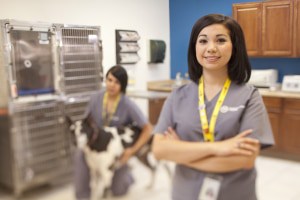In Their Shoes – Veterinary Assisting
 There are two sides to every story, and sometimes as a professional, it can help to put yourself in another person’s shoes. It can give you a different perspective on a work or personal situation, and it might just make you think differently about the way you do things.
There are two sides to every story, and sometimes as a professional, it can help to put yourself in another person’s shoes. It can give you a different perspective on a work or personal situation, and it might just make you think differently about the way you do things.
To work as a veterinary assistant takes a certain type of person; a love for animals for sure, empathy for their humans of course, and a tough heart that can show both compassion and fortitude. If you’re studying in our Veterinary Assisting program, your personal skills are equally as important as your technical skills because it’s likely that you could find yourself working in an emotionally charged atmosphere.
For many people their ‘fur-kids’ really are part of the family, so when they have to go to a veterinary office, especially for a non-routine visit, it can be as stressful as taking a child to the emergency room.
A few weeks ago, we spoke to customers of a veterinary hospital in Arizona about their experiences, and their views of the veterinary assistants they had dealt with.
When we visit the vets, we expect the same care, concern and empathy as we would receive in a ‘human hospital’. The attitude of the vet assistant is representative of the practice, as we often spend more time in the company of the assistant than we do with the vet.
We recently had to have our beloved family dog Jasper put to sleep; our youngest son was devastated as you would expect, but we thought it was important for him to be there with Jasper at the end. The vet and his assistant couldn’t have been more empathetic, especially to our son. It was obviously a very difficult situation for us all, but they patiently let us say our goodbyes. We’re very grateful for the way they talked to us, and they tried to offer some comfort to our son.
I’ve had both good and bad experiences to be honest; there was one instance a couple of years ago where they couldn’t get to the bottom of my dog’s condition; I was obviously frustrated and concerned, but the assistant I was ‘handled’ by gave me the impression that she thought I was nothing more than a ‘neurotic mother’. But on a different visit with my daughter’s cat, the vet’s assistant who looked after us couldn’t have been more caring and compassionate. Even though the reason for every visit is to see the vet, the way you’re treated by their assistants really makes or breaks the experience.
Our 90lb German Shepherd does not enjoy vet visits; we’ve had several instances over the years where he has needed to be taken to the back of the practice for blood draws, x-rays or procedures. Needless to say he doesn’t want to leave me to go back there. I’ve seen vet assistants who have literally tried to drag him by his choke collar, which was distressing for him and us. But I have also seen others who have calmed and encouraged him to go with them – which makes it a much more pleasant experience for us all. The best techs are those who understand that my dog is part of my family, and I want him to be treated as such.
These four experiences show the impact that a veterinary assistant (good or bad) can have on a customer’s impression of a veterinary practice, and on the reputation of your employer. That is why ‘soft skills’ are as equally important to employers in this profession as your technical skills. If you’re a student or a graduate of any of our programs, make sure that you always consider your patients, and what it would be like to be ‘in their shoes’ in any given situation.
For comprehensive consumer information on our Veterinary Assisting Program, visit carrington.edu/degrees/veterinary-assisting/ Program availability varies by location.